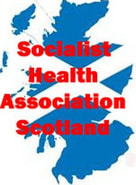GP surgeries face a recruitment crisis - with a survey earlier this year finding 17 per cent are short of at least one doctor. In Forth Valley there are three practices that have been taken over by the health board because of an inability to recruit doctors. The Leith Links Medical Centre, Edinburgh has had its boundaries redrawn to cut its patient list from 8,300 to 6,300 after two unfilled recruitment rounds left the three remaining GPs dependent on locum support. One third of existing GPs are likely to retire within the next five years.
Proposals are being considered which may mean family doctors in Scotland no longer employ their own practice staff and pass on jobs such as ensuring patients with long term conditions are regularly monitored.
Health Minister Shona Robison in an interview with the GP magazine Pulse said:
“Something quite compelling came from those discussions: we need to work towards a model that has a wider primary care team of various health professionals, to remove some of the workload from GPs. The GP would still provide services and be the clinical expert to that primary care team.”
Dr Alan McDevitt, chair of the British Medical Association's Scottish GP Committee (SGPC) said: "The reason we are doing this is all about making sure we free-up GP time not just for more appointments but also because the complex care we have to do for elderly patients means 10 minute appointments are not long enough. We have to start preparing for the future (with more elderly patients). We need to make sure we can give more time to older patients with complex conditions."
So could this mean a fully integrated service with salaried GP’s? Well, there are of course many salaried GPs in Scotland. In the main they work for independent GP practices, employed on a standard contract. These proposals are not aimed at ending the independent contractor status, but they might take away some of the ancillary and administrative tasks. The new Health and Social care partnerships could take over more of these roles.
The old school BMA approach is set out by Brian Keighley in the Herald:
“A salaried service will not fix it. The independent contractor status of GPs is good for the sanity of doctors. It's easier to face local problems with local leadership and solutions. But independent GPs are also good for patients who look to their doctor to be their advocate in an NHS of byzantine complexity and to provide continuity of care in the face of super-specialism in other parts of the service. So, it's good news that there is a commitment to adapt and improve the GP contract that could allow the NHS to begin again to value its highly skilled workforce.”
In England, Labour’s Andy Burnham was proposing 'whole person care' centred on full integration of health and social care in a single service. While he pulled back from requiring GPs to be salaried, conceding that independent GPs could be part of the system, it was clear that he expected far more salaried GPs.
Many potential GPs, particularly women, are put off becoming GPs by the prospect of having to become a partner in a small business. As the income comes almost entirely from the NHS, the model has always been an anachronism. The first stage may well be to employ all the practice staff, leaving GPs to do what they are trained for. That could lead, over time, to greater integration and contractor status withering on the vine. We are a long way from that position in Scotland, but it may be that we are seeing the first steps towards a more rational system.
Lets give the last word to Glasgow GP Dr Margaret McCartney’s alternative health manifesto for GPs. Her final line:
“Let GPs get back to the job they love – that is, getting to know their patients, having conversations over time, understanding what’s important and what’s not, sharing decisions, making plans, supporting families, understanding the area they work in. Make GP the incredible job it is.”

 RSS Feed
RSS Feed